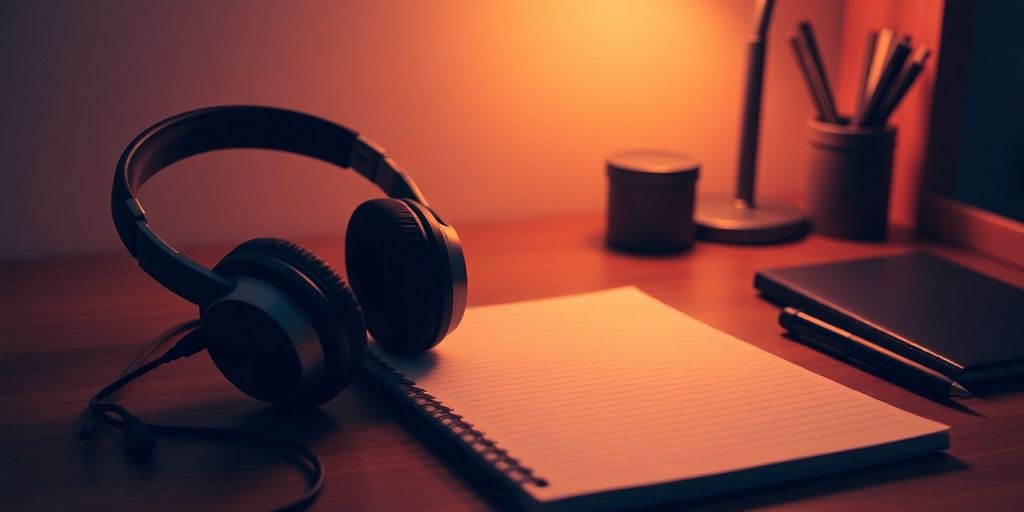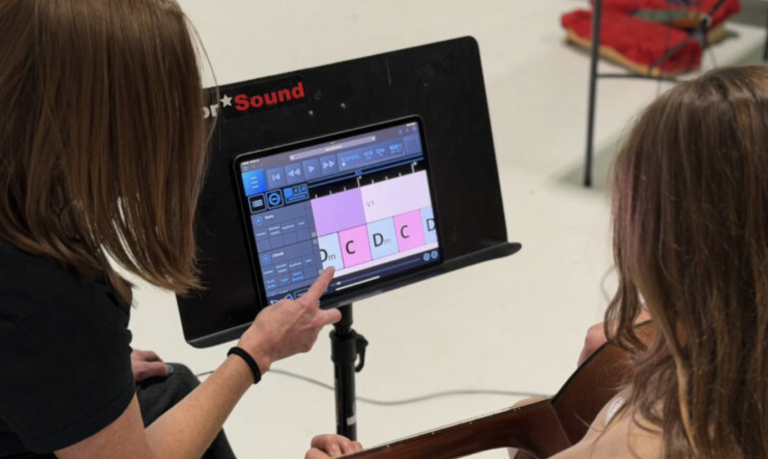
Finding the right study music can really make a difference in how well you focus and get things done. With so many options available, it can feel overwhelming to figure out what works best for you. Luckily, research shows that certain types of music can help improve concentration and make studying feel less stressful. This article will guide you through the benefits of study music, how to create the perfect playlist, and tips for maximizing its effectiveness.
Key Takeaways
- Experiment with different music genres to discover what helps you focus best.
- Avoid songs with lyrics that can distract you from your work.
- Create a balanced playlist that mixes different styles and tempos.
- Consider using instrumental tracks or ambient sounds for a calming study environment.
- Regularly update your playlist to keep your study sessions fresh and engaging.
Tips For Maximizing Study Music Effectiveness
Experimenting With Different Genres
Don’t just assume one kind of music is the key. The best way to find what works for you is to explore. What helps your roommate might not help you. Maybe classical music puts you to sleep, but lo-fi hip-hop keeps you locked in. Or maybe ambient sounds are your thing. Give different things a try! You might be surprised by what you find.
Avoiding Distracting Lyrics
Not all music is equal when it comes to studying. Some music can be helpful, but other types can be distracting. Music with lyrics can pull your attention away, especially if you’re trying to read or write. Similarly, music with a fast tempo or a lot of changes can be too stimulating and make it hard to concentrate. It’s important to choose your music carefully and be aware of how it’s affecting your focus. If you find yourself singing along instead of working, it’s time to switch to something else. It’s also a good idea to explore music theory to understand how music affects your focus.
It’s important to remember that everyone is different, and what works for one person might not work for another. The key is to experiment with different types of music and find what helps you focus and be productive. Don’t be afraid to try new things and see what works best for you. And don’t get discouraged if you don’t find the perfect study music right away – it might take some time and effort to find what you’re looking for.
Creating A Balanced Playlist
Creating a balanced playlist is key to maintaining focus and avoiding mental fatigue during long study sessions. Here are some tips:
- Mix it up: Don’t stick to just one genre. Alternate between different types of instrumental music to keep your brain engaged.
- Consider the tempo: Match the tempo of the music to the task at hand. Slower tempos are good for deep concentration, while faster tempos can help with more routine tasks.
- Include ambient sounds: Incorporate nature sounds or white noise to create a calming and distraction-free environment. This can be especially helpful if you’re studying in a noisy place.
Also, remember that study music is a tool, and like any tool, it’s most effective when used correctly. Consider when you’re using music. Is it for focused work, or just to get you in the mood to start? Maybe you only use it for certain subjects. Also, think about breaks. Don’t listen to music non-stop. Give your ears (and brain) a rest.
Who Benefits From Productivity Playlists

Productivity playlists? They aren’t just for one kind of person. They’re surprisingly useful and can really help anyone who wants to focus better and get more done. Let’s look at some groups who can really get a boost from them.
Students
For students, juggling classes, homework, and tests can be super stressful. Productivity playlists can be a lifesaver for staying focused during those long study times. Think about it: a good playlist can cut down on distractions, making it easier to learn and stay on task. It’s like having a personal focus helper! When you are staring at textbooks all day, study music can be a great help.
Professionals
At work, the pressure to be productive is always there. Whether you’re working from home or in a busy office, productivity playlists can help you create a focused space. They can be really helpful for tasks that need deep focus or for blocking out distracting office sounds. It’s an easy way to boost focus and get more done during the workday.
Creative Individuals
Creative work often needs a good mix of focus and inspiration. Productivity playlists can help creative people get into their flow state by giving them a steady and non-distracting background sound. Instrumental music, ambient sounds, or even carefully chosen electronic tracks can help spark creativity and keep those ideas flowing. It’s all about finding the right music to set the mood and get those ideas going.
Creating The Perfect Study Music Playlist
So, you’re ready to put together the ultimate study playlist? It’s not just about throwing a bunch of songs together; it’s about crafting an experience that keeps you locked in. Think of it as your secret weapon against distractions. Let’s get into it.
Choosing Instrumental Tracks
Lyrics can be super distracting when you’re trying to absorb complex information. Instrumental tracks are your friend. Opt for music without words to provide a rhythmic background without the interference of someone singing in your ear. This helps maintain focus and prevents your mind from wandering off to the story in the song.
Incorporating Ambient Sounds
Ambient sounds can be a game-changer. Think nature sounds, white noise, or even coffee shop ambience. These sounds can mask distracting noises and create a calming environment. Here’s a quick guide:
- Nature Sounds: Rain, ocean waves, forest sounds. Great for relaxation.
- White Noise: Blocks out distracting frequencies. Good for focus.
- Brown Noise: Deeper than white noise, can be less harsh.
- Pink Noise: Balances high and low frequencies, often soothing.
Curating A Flowing Experience
Creating a playlist that flows well is key. You don’t want jarring transitions that pull you out of your zone. Start with calmer tracks and gradually increase the energy as you get deeper into your work. Think of it like a gentle ramp-up. Also, consider the overall length of your playlist. A good playlist should last at least a couple of hours to avoid repetition. You can find the right study music to set the mood and get those ideas flowing.
Finding the right study music is a personal journey. What works for one person might not work for another. The key is to experiment with different genres and find what helps you stay focused and productive. Don’t be afraid to try new things and see what resonates with you.
The Science Behind Study Music
Cognitive Benefits
Okay, so how does music actually help you focus? It’s not just some random thing. Certain kinds of music can really change how your brain works. Think of it like this: your brain is a super complex machine, and music can be a tool to fine-tune it. When you’re trying to learn something new, your brain needs to be in the right state. Music can help get it there. It can help enhance cognitive abilities, improve concentration, and create an ideal study environment.
- Improved focus
- Reduced anxiety
- Better memory
Music can act as a key that unlocks cognitive benefits during study sessions. Scientific research has shown that the right kind of music can positively impact areas of the brain involved in concentration and memory. When studying, music can help enhance focus by decreasing external noise, reducing anxiety, and promoting a conducive mental state for absorbing information.
Emotional Impact
Listening to music is scientifically proven to enhance mood. A positive mood can make you feel more motivated and less stressed, which is a big deal when you’re facing a tough study session. It’s like giving your brain a little pep talk. When you feel good, you’re more likely to stick with it and actually learn something.
Enhancing Concentration
Ever notice how some sounds just fade into the background, while others totally grab your attention? The right study music should be the former. It should help block out distractions without being distracting itself. Instrumental music is great for this. It fills the silence without pulling your focus away from your books. Think of it as a sonic shield, protecting your concentration.
| Type of Music | Effect on Concentration |
|---|---|
| Classical | Generally improves |
| Lo-Fi | Can enhance |
| Ambient | Often very effective |
Popular Genres For Study Music
Figuring out what to listen to while studying can be a game changer. It’s not just about throwing on your favorite tunes; it’s about finding music that actually helps you focus. Some genres are way better at this than others. Let’s look at some popular choices.
Classical Music
Classical music is a classic for a reason! The complex structure and harmonies can be super engaging for your brain. Think Bach, Mozart, Beethoven. It’s not just background noise; it can actually help boost your cognitive functions. Some say listening to classical music can even improve memory. It’s worth a shot, right?
Lo-Fi Hip-Hop
Lo-fi hip-hop has become super popular for studying, and I get it. It’s chill, repetitive, and doesn’t have a lot of crazy changes that will distract you. The mellow beats and simple melodies create a nice, calm atmosphere. It’s like a rhythmic ally for your brain, helping you stay focused without being too stimulating. Plus, there are tons of playlists available, so you can find something that fits your vibe.
Ambient Soundscapes
Ambient soundscapes are another great option if you want something really subtle. These often feature nature sounds, like rain, wind, or ocean waves. The idea is to create a calming environment that helps you relax and concentrate. It’s like a white noise machine, but way more pleasant. If you’re easily distracted by music with a strong beat or melody, ambient soundscapes might be perfect for you. They can help reduce stress and create a better study environment.
Music can be a powerful tool for creating the right study environment. It’s about finding what works for you and using it to your advantage. Experiment with different genres and see what helps you stay focused and motivated. Just remember to listen to your body and take breaks when you need them.
Setting The Right Environment
Okay, so you’ve got your playlist ready to go. But let’s be real, music alone isn’t going to magically make you ace that exam or finish that project. You need the right environment too. Think of it like planting a seed – good soil makes all the difference. Here’s how to set the stage for maximum focus.
Creating A Distraction-Free Zone
First things first: eliminate distractions. I know, easier said than done, right? But seriously, a clean, organized space is key. That means putting your phone on silent (or better yet, in another room), closing unnecessary tabs on your computer, and telling your family/roommates that you need some uninterrupted time.
Here’s a quick checklist:
- Clear your desk of clutter.
- Silence notifications on all devices.
- Inform others of your study/work schedule.
Using Quality Headphones
Headphones are a game-changer. Not only do they block out external noise, but they also help you get into the zone. I’ve tried a bunch of different types, and honestly, it depends on your preference. Some people swear by noise-canceling headphones, while others prefer earbuds. Experiment and see what works best for you. Good headphones are a must for any serious study session.
Adjusting Volume Levels
Volume is crucial. Too loud, and you’ll get a headache and lose focus. Too quiet, and you’ll still hear every little noise around you. The sweet spot is a volume where you can hear the music clearly, but it’s not overpowering. I usually aim for a level where I can still hear someone talking to me, but I have to concentrate to understand what they’re saying. Finding the right volume is key to staying focused.
Creating a dedicated study space is more than just picking a spot; it’s about crafting an environment where learning becomes an experience. It’s about minimizing distractions, optimizing comfort, and setting the stage for deep concentration. This space should be a sanctuary for your mind, a place where you can immerse yourself in your studies without the constant tug of external interruptions.
Personalizing Your Study Music Experience

It’s easy to just grab a pre-made playlist, but the real magic happens when you tailor your study music to your brain. What works for your friend might be a total focus-killer for you. Don’t be afraid to experiment and get specific.
Finding Your Unique Sound
Think about what kind of music naturally puts you in a good mood and helps you concentrate. Is it the intricate layers of classical music, the steady pulse of lo-fi hip-hop, or something totally different? Consider these points:
- Experiment with genres: Don’t limit yourself to the usual suspects. Try jazz, electronic, or even movie soundtracks.
- Note your reactions: Pay attention to how different types of music affect your focus and energy levels.
- Be open to the unexpected: You might discover a genre you never thought you’d study to.
Mixing Genres
Once you’ve identified a few genres that work for you, try mixing them up in a single playlist. This can keep things interesting and prevent your brain from getting too used to one sound. For example, you could alternate between classical pieces and ambient tracks to create a balanced listening experience. A consistent "study soundtrack" of favorite music can help improve focus.
Updating Your Playlist Regularly
Your musical tastes and focus needs will change over time, so it’s important to keep your study playlist fresh. Add new tracks, remove old ones, and experiment with different arrangements. This will help prevent your playlist from becoming stale and losing its effectiveness.
The best study music is the music that works best for you. Don’t be afraid to break the rules and create a playlist that’s as unique as your study style.
Wrapping It Up: Your Soundtrack to Success
So, there you have it. Music can really change the game when it comes to studying and getting things done. Whether you’re hitting the books for an exam or tackling a big project at work, the right tunes can help you focus and keep distractions at bay. Remember to try out different genres and see what works best for you. Maybe it’s classical, or perhaps some chill lo-fi beats. Whatever it is, make it your own. Just don’t forget to keep it instrumental if lyrics tend to pull your attention away. With a solid playlist, you’ll find yourself more productive and less stressed. So go ahead, create that perfect study soundtrack, and watch your productivity soar!
Frequently Asked Questions
What type of music is best for studying?
Genres like classical, ambient, and lo-fi hip-hop are great for studying because they help you focus without being distracting.
Can listening to music really help me study better?
Yes! Music can boost your mood, reduce stress, and improve concentration, making it easier to learn.
Should I listen to music with lyrics while studying?
It’s best to avoid music with lyrics, as they can be distracting. Instrumental music is usually a better choice.
How do I create a good study playlist?
Start by picking instrumental tracks that you enjoy, mix in some ambient sounds, and make sure the flow keeps you focused.
Can everyone benefit from study music?
Absolutely! Study music can help students, professionals, and anyone needing to concentrate better.
How often should I update my study playlist?
It’s a good idea to update your playlist regularly to keep it fresh and engaging, so you stay motivated.








